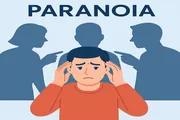Paranoia: what it is, how it manifests, and how it can be treated
If you’ve never heard of paranoia, or have only encountered the term casually, be aware that it is actually a very serious disorder. It deeply affects the person suffering from it, to the point that they constantly believe that others have harmful intentions toward them. A paranoid individual is always suspicious of the people around them or those they meet, because their thought patterns are shaped by a firm belief that others’ thoughts and intentions are potentially damaging to them, which causes fear.
According to how a paranoid person sees the world, others are a source of danger, and their behavior is generally perceived as something that will inevitably bring harm.
Others are dangerous
So how does a paranoid personality perceive others? What thoughts go through their mind?
Those with this disorder are always inclined to believe that others are harmful and dangerous. Therefore, their interpretation of other people’s everyday actions is automatically malevolent.
When interacting with a paranoid person, they are deeply convinced that damage will come from those around them. But one must ask: is there any objective basis for these perceptions and beliefs?
In reality, no. The paranoid personality is firmly convinced of this perspective despite having no objective evidence—no concrete elements that would reasonably lead someone to believe there is any hidden malicious intent in the actions of others.
Are there any statistics that give us an idea of how many people suffer from this condition?
Yes. In the United States, about 4% of the population experiences this type of mental condition each year. Is it more prevalent in men or women?
Generally speaking, men are more frequently affected than women.
A disorder rooted in the family context
It has been observed that paranoia occurs more frequently within families. It is hypothesized that there may be a connection to a history of physical or psychological abuse in the family.
Frequently, individuals with this disorder are also affected by other psychiatric conditions, such as:
- A form of schizophrenia
- Anxiety-related disorders
- Post-traumatic stress disorder (PTSD)
- Substance abuse disorders, such as alcohol addiction
- Borderline personality disorder
Symptoms of paranoid personality
What are the specific symptoms exhibited by someone who suffers from paranoia? Let’s look at them in detail:
- They believe others are trying to deceive them.
- They are convinced that others want to exploit them.
- They see others as a potential threat and believe they will be harmed.
- They expect to be attacked at any moment.
- They have no objective evidence to justify their belief that others will harm them.
Patients with this condition often show characteristic traits, including a deep conviction that they’ve been harmed by others in the past. As a result, they display the following behaviors:
- They are highly alert and vigilant.
- They pay extreme attention to how others express themselves, fearing insults.
- They are convinced that others might threaten them.
- They fear betrayal and unfair behavior.
- They obsessively search for hidden meanings in others’ words.
- They constantly look for evidence in others’ behavior to confirm their suspicions.
This worldview leads them to misinterpret others’ intentions. For example, if someone offers help, they might interpret it not as kindness, but as an implication that they are incompetent.
If they become convinced that someone has insulted or offended them, they can show a high degree of inflexibility and resentment. They don’t forgive easily. If they believe they’ve been wronged, they respond with oppositional, hostile, or aggressive behavior.
Their extreme mistrust becomes so intense that they feel a strong need to act independently and always maintain control. They are very reserved and reluctant to confide in others, fearing their words might be used against them.
They are skeptical about the loyalty of friends and doubt the fidelity of romantic partners, which results in pathological jealousy. Every gesture, action, or behavior of their partner becomes suspect and subject to doubt.
This way of seeing others makes it very difficult to maintain good relationships. If others respond with aggression or hostility, the paranoid person sees that as proof of their suspicions.
Diagnosing the disorder
To make a diagnosis, some basic clinical criteria must be met. These patients typically:
- Constantly distrust others.
- Believe others are exploiting them.
- Are preoccupied with doubts about the loyalty of friends.
- Avoid confiding in others out of fear that their words will be used against them.
- Always see hidden, malicious intent in others’ behavior.
- Hold grudges and do not easily forget offenses.
- Feel constantly attacked in their identity and personality, and respond with anger and aggression.
- Constantly suspect their partner of being unfaithful.
Therapeutic approaches
How can this condition be treated? What therapeutic strategies can be used?
Due to their deep mistrust, it’s very difficult to establish a relationship with a paranoid patient. In some cases, a doctor might try to gently validate a few of the patient’s suspicions in order to open a communication channel.
Treatment may include antidepressants and antipsychotics, which help reduce anxiety and facilitate therapeutic dialogue.

